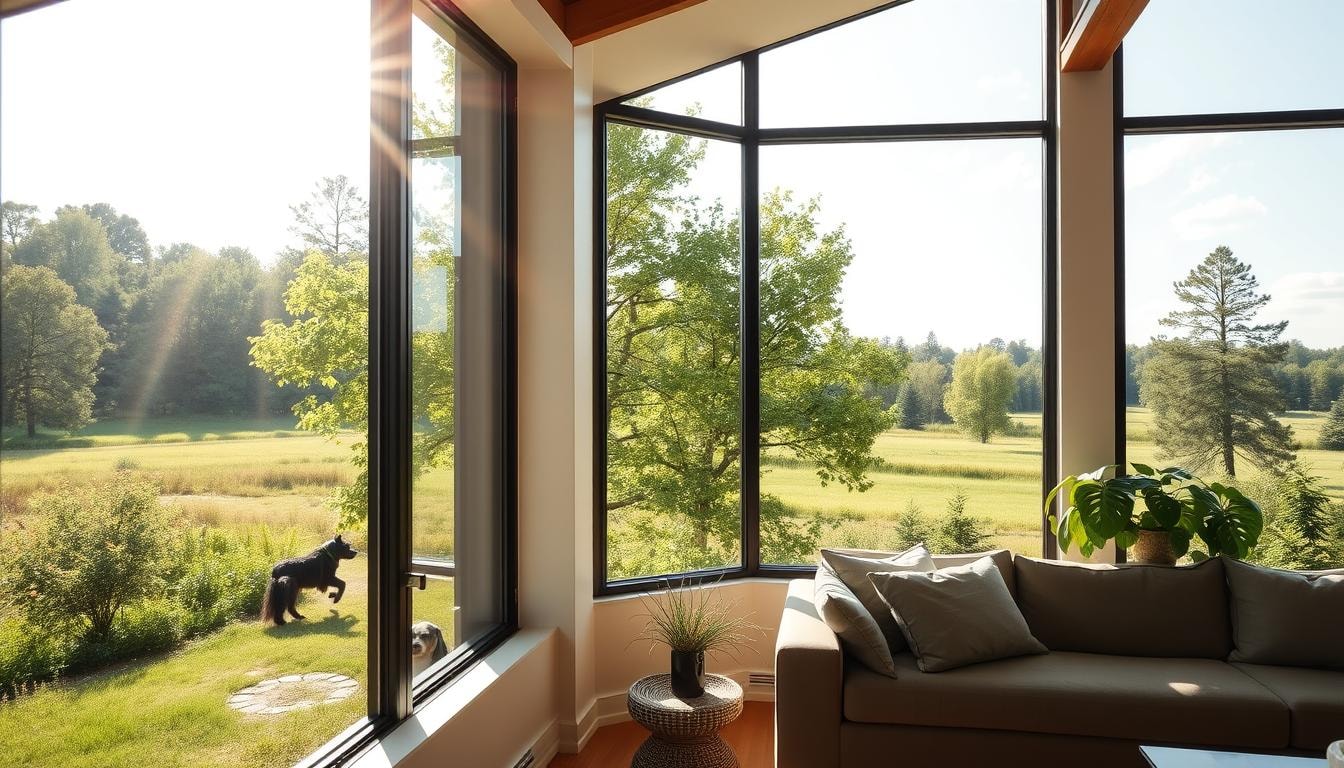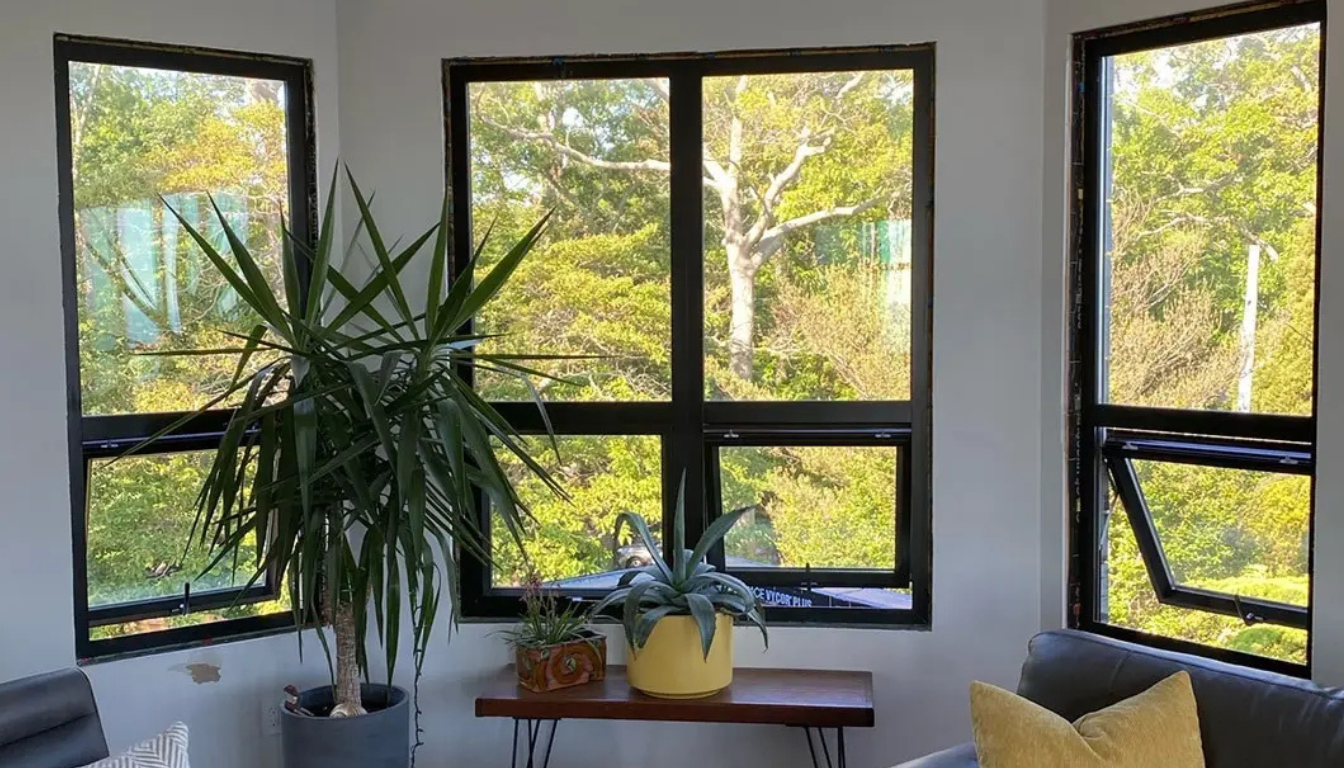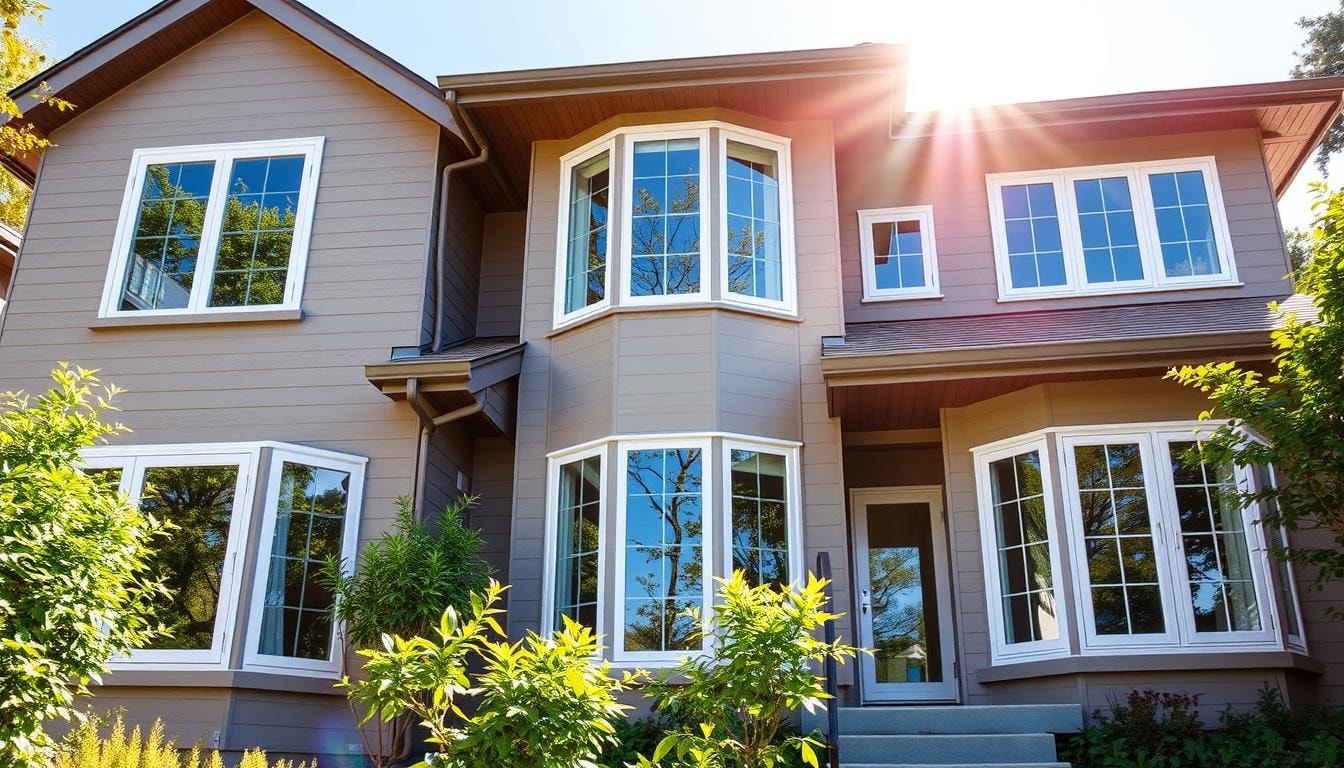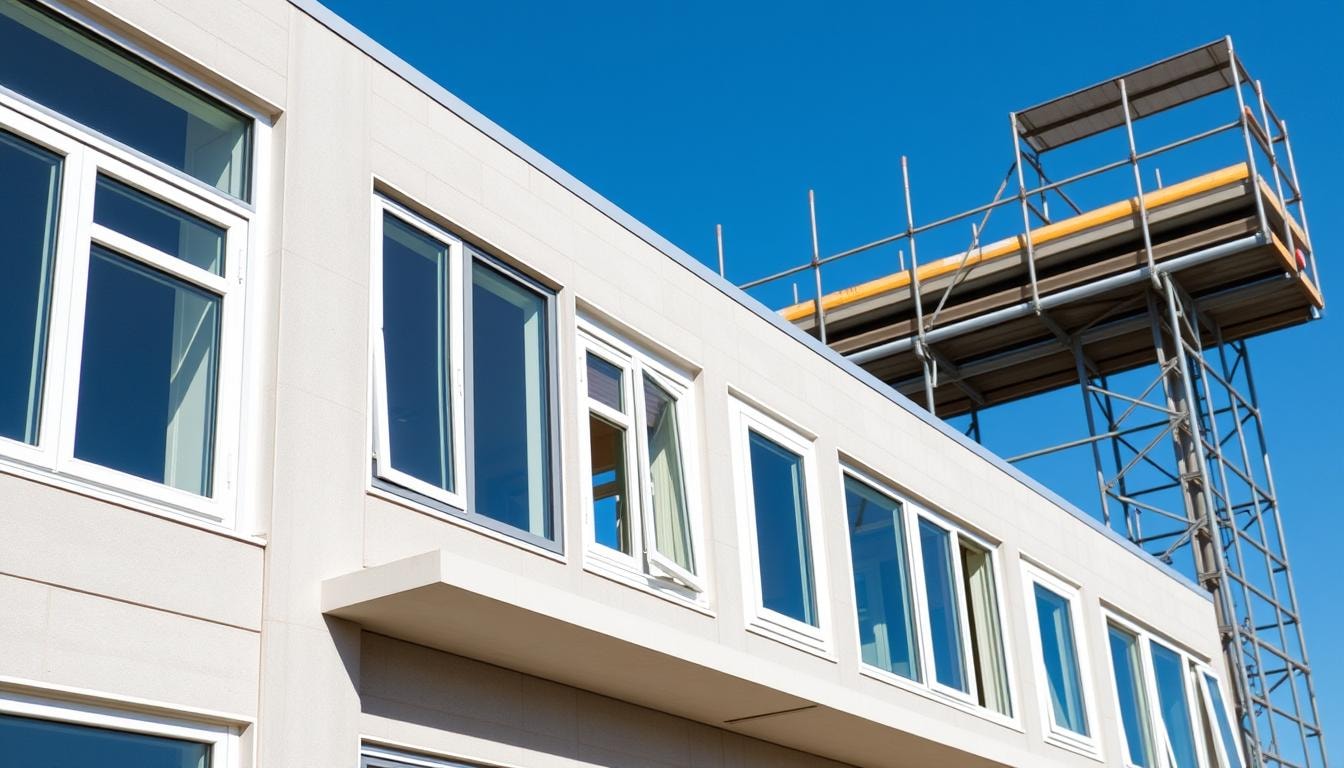
New Construction Windows: What You Need to Know Before Hiring
Thinking about new windows for your home? They promise better energy use and more value. But finding the right installer can be tough. It’s key to know what makes new windows different and what skills your installer should have.
Key Takeaways
- Proper window installation is crucial for maximizing energy efficiency and long-term benefits.
- Credentials, experience, and specialization are vital when hiring a window installation contractor.
- Look for licensed, insured, and experienced professionals with a strong reputation in the local community.
- Carefully review warranty terms and ensure the contractor offers comprehensive coverage.
- Understand the unique installation requirements for new construction versus replacement windows.
Understanding New Construction Windows vs. Replacement Windows
Homeowners have two main choices for windows: new construction and replacement windows. The type you pick affects your home’s design, how it’s installed, and its value over time.
Key Differences in Design and Application
New construction windows are made for new homes or big renovations. They offer more flexibility in size, shape, and style. Replacement windows, however, fit into existing openings. This makes them easier to install.
Cost Comparisons and Long-term Value
Replacement windows cost less than new construction ones because they need less work. But, they’re more energy-efficient, saving you money on bills. New construction windows might cost more upfront. Yet, they can make your home look better and increase its value.
Installation Requirements for Each Type
Installing new construction windows is more complex than replacing them. You need to frame walls or sills for a perfect fit. Replacement windows, though, can be added anytime. This makes them great for quick updates without big changes.
When deciding between new construction and replacement windows, think about your project, budget, and future value. Talk to window experts to find the best fit for your home and taste.
The Impact of Energy-Efficient Windows on Home Performance
Energy-efficient windows can greatly improve your home. They help save energy and make your home more comfortable all year.
Choosing windows with triple-pane glass can cut your heating and cooling costs by up to 30%. They stop drafts and keep your home at a steady temperature. This means your home stays cozy, no matter what’s outside.
These windows also boost your home’s insulation. This is great for places with really hot or cold weather. By picking the right windows, you can live more comfortably and help the planet.
Energy-efficient windows can also raise your home’s value. Buyers today want homes that save energy. Installing these windows can make your home more attractive and valuable. This can save you money on bills and increase your home’s worth.
When picking energy-efficient windows, think about the material, number of panes, and insulation quality. Researching well can help you choose the best windows for your home and taste.
Essential Factors in Window Material Selection
Choosing the right window frame material is key for new construction windows. You can pick from vinyl, wood, aluminum, or fiberglass. Each has its own benefits and drawbacks. Knowing these can help you choose the best fit for your home, budget, and local weather.
Vinyl Windows: Pros and Cons
Vinyl windows are loved for being affordable and easy to care for. They stand up well to weather, corrosion, and rot. Plus, they keep your home warm or cool, saving energy. But, they might not look as good as wood, and you can’t change their color much.
Wood Windows: Traditional Appeal and Maintenance
Wooden frames give your home a classic look. You can stain or finish them to match your home’s style. But, wood needs more care to avoid damage from weather.
Aluminum and Fiberglass Options
Aluminum windows are strong and last long, great for tough weather. They’re also easy to keep up and don’t rust. Fiberglass windows offer strength, energy saving, and style. They’re tough against extreme weather and don’t warp or fade.
Think about your climate, budget, style, and upkeep needs when picking window frames. Weighing the good and bad of each can help you pick the right one. This choice will make your new home look and work better.
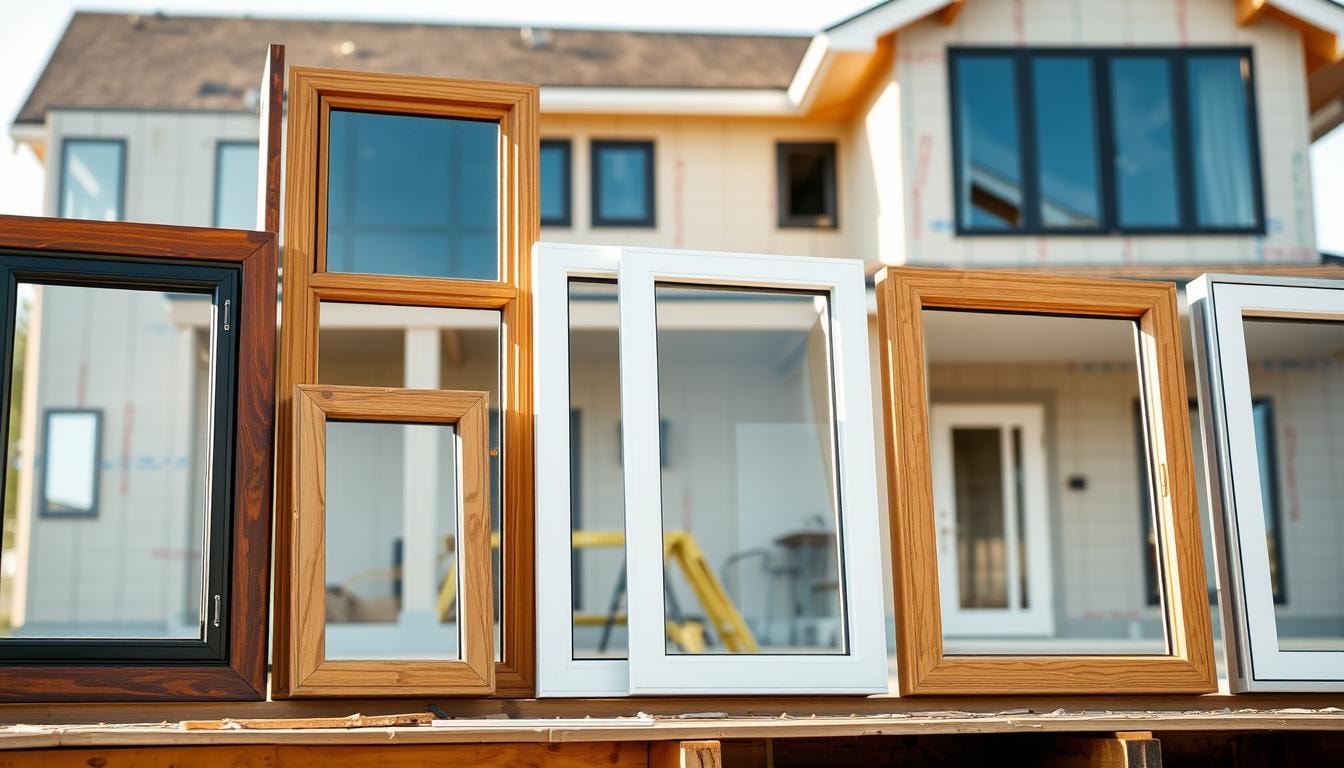
Understanding Window Installation Costs and Budgeting
Replacing windows is a big deal for homeowners. It’s key to know the costs to plan your budget well. The cost can change a lot based on size, material, energy efficiency, and how it’s installed.
Labor Costs and Time Estimates
Labor costs for installing windows are usually the biggest part, making up to 60% of the total cost. The time it takes to install can also affect the price. More complex jobs take longer and cost more in labor.
Things like how many windows, how easy they are to reach, and if you need to change the structure can also change labor costs.
Material Price Ranges
The material you choose affects the cost a lot. Vinyl windows are the cheapest. Wood, fiberglass, and aluminum are pricier. Custom shapes, sizes, or special energy features can also raise the price.
Additional Expenses to Consider
- Disposal of old windows
- Structural modifications to the window openings
- Permits and inspections, if required
- Unexpected repairs or hidden issues that may arise during the installation process
To plan your budget, get detailed quotes from different contractors. Make sure they break down the costs of materials and labor. This way, you can prepare for any surprises and have a solid budget.
Evaluating Window Contractor Credentials and Experience
Choosing the right window contractor is key for new construction windows. Good installation boosts your home’s energy use, safety, and looks. Before you pick a contractor, think about these important points:
- Licensing and Insurance: Make sure the contractor has the right licenses and insurance. This includes liability and workers’ comp. It keeps you safe and makes sure subcontractors are covered too.
- Specialized Training: Ask if the contractor has special training for window installation. Look for those who have gone through approved programs or have industry-recognized skills.
- References and Reviews: Ask for references and check them out. Also, look up online reviews from different places to see how good the contractor is.
- Experience: Choose a contractor with lots of experience in window installation. More projects mean they’re ready for any problems that might come up.
Checking your contractor’s credentials and experience well means your windows will be installed right. This improves your home’s energy use, safety, and looks.
The Window Installation Process Explained
Replacing your home’s windows is a big deal. Knowing the installation process is key for a smooth project. It includes three stages: getting ready before, the day of installation, and checking after.
Pre-installation Preparation
Before the team comes, you must prepare. Measure your windows right, order your new ones, and clear the area. Measuring can take a few hours to get it right.
Also, remove any plants or decorations that might get in the way.
Installation Day Procedures
The crew will arrive early, around 7:30 a.m. or 9 a.m. They’ll take out the old windows and put in the new ones.
The goal is to finish all windows in a couple of days. This keeps your home closed for less time.
Post-installation Inspection
After the windows are in, the team checks them all. They might adjust the windows or fix any issues. They also clean up and protect your floors.
This process aims to keep your home tidy and minimize disruption.
Knowing the steps from start to finish helps set the right expectations. It ensures your home improvement project goes well.
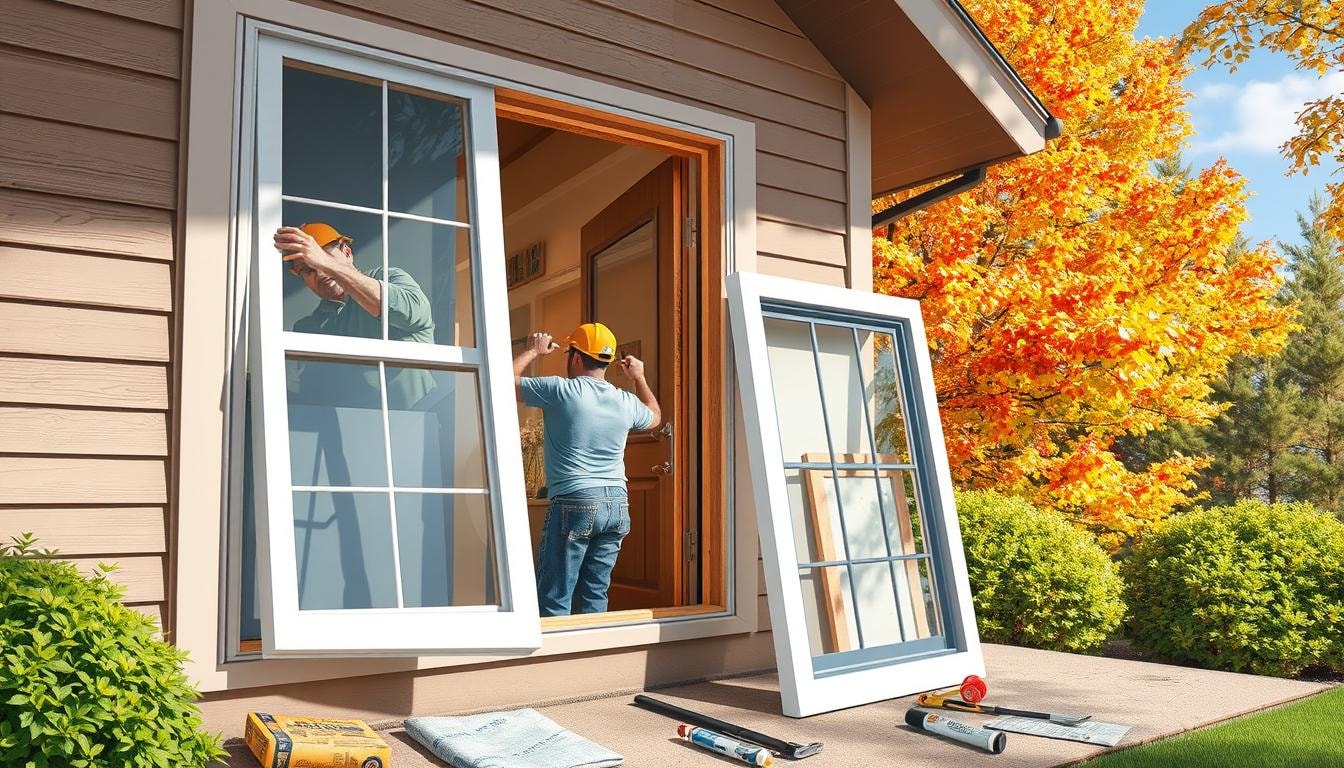
Warranty Coverage and Long-term Protection
When picking new windows, look for a good warranty. The best is a lifetime warranty that covers both the windows and the installation. It’s important to know what the warranty includes, like materials, labor, and any future problems.
Most window warranties have a “1-2-10” format. This means one year for craftsmanship, two years for systems like plumbing and electrical, and ten years for structural issues. Also, make sure the warranty can be passed on if you sell your home.
- Lifetime window warranty covers both the product and installation
- Typical warranties offer 10 years for the product and 2 years for labor
- Warranty should be transferable if you sell your home
Don’t forget about the installer’s warranty too. A good window contractor should offer a warranty for installation problems. This gives you long-term peace of mind.
By researching warranties and picking quality windows with a lifetime warranty, you protect your investment. Manufacturer guarantees and a window warranty are crucial when choosing new windows.
Popular Window Styles and Design Options
Choosing the right window styles and designs is key when building or updating a home. It affects both looks and function. Homeowners can pick from many options to make their home look better and save energy.
Contemporary vs. Traditional Designs
For a modern feel, consider casement or sliding windows. They have clean lines and big glass for lots of light. If you like classic looks, double-hung or bay windows are great. They add timeless beauty to any home.
Grid Patterns and Glass Options
- Grid patterns, or grilles, add interest to windows. You can choose simple or fancy designs. This lets you make your windows unique.
- The glass in windows also matters. You can pick clear, tinted, or decorative glass. This choice depends on your style and lighting needs.
Choosing the right windows is all about what you like and your home’s style. A good contractor can help you find the best mix of looks and function. This way, you get a beautiful and energy-saving home.
Weather Considerations and Regional Requirements
When picking new windows for your home, think about your local weather and building codes. The right windows can make your home more energy-efficient and comfortable.
In cold areas, choose windows that keep heat in. Double-pane and triple-pane glass can save a lot of energy. Stay away from aluminum frames because they don’t keep heat well. Vinyl or composite frames are better for keeping warmth in.
In hot places, windows with low-E coatings can block heat and save on cooling costs. If you live near the coast and worry about storms, get windows that can handle strong winds and rain.
- Make sure windows follow local building codes and save energy
- Use the ASHRAE climate zone map to find the best windows for your area
- Think about U-Factor, Solar Heat Gain Coefficient (SHGC), and how they handle moisture
Talk to your window contractor about the best windows for your area. They should be weather-resistant, energy-saving, and meet local codes. This will make your home more comfortable and follow local rules.
Understanding Building Codes and Permits
Knowing local building codes and permit rules is key for window installation. Many projects need permits, especially if you change window sizes or locations. It’s vital to have a contractor who knows the rules and gets the right permits for safety and energy savings.
Building codes keep structures safe and energy-efficient. Following these laws is a must for your family’s safety and to avoid fines or legal trouble. Not getting the right permits can lead to big fines or even having to tear down your project.
- Residential building permits are needed for window changes or additions.
- Commercial projects, like office buildings, need special permits too.
- Permits for electrical or plumbing work might also be needed.
Getting a permit involves checking plans and reports. This can take a few weeks. After approval, you can start the installation. Inspections will check if everything follows the plan.
Knowing about window regulations, building permits, and code compliance helps your project go smoothly. It keeps your home safe and legal, giving you peace of mind.
Ready for Your New Windows and Patio Doors?
At Budget Windows, our team of experts is dedicated to helping you find the best choice for your newly built homes or exterior renovations. We understand the detail that goes into your vision for your home’s life, and we’re here to guide you through the process every step of the way. Contact us today to speak with our professionals and let us bring your dream home to life.
Conclusion
Getting new windows can make your home more energy-efficient and comfortable. It also boosts your home improvement value. It’s key to pick the right windows and work with a skilled contractor.
Think about the window type, materials, energy saving, and local window replacement benefits. Verifying a contractor’s credentials and getting detailed quotes are important. Understanding the installation process is also crucial.
FAQ
What are the key differences between new construction windows and replacement windows?
New construction windows offer more flexibility in size and style for building new homes or doing major renovations. Replacement windows are designed to fit into existing openings, making them easier to install. New construction windows may cost more but can increase home value, while replacements tend to be more budget-friendly.
How do energy-efficient windows impact a home’s performance?
Energy-efficient windows with triple-pane glass can reduce heating and cooling costs by up to 30%. They also enhance insulation to maintain steady indoor temperatures, saving money and increasing home value.
What factors should be considered when selecting window frame materials?
When choosing new construction window frames, consider your local climate, budget, home’s aesthetic, and maintenance needs. Vinyl is affordable and low-maintenance, while wood offers classic style with more upkeep. Aluminum is durable, and fiberglass provides energy efficiency and style.
What are some key credentials and experience to look for when hiring a window installation contractor?
Look for a licensed, insured contractor with specialized training and a strong local reputation. Verify their experience completing many window installation projects to ensure a smooth process for your new home or existing property.
How can homeowners determine the right windows and doors for their new or existing home?
When selecting new construction windows, patio doors, or replacing them in an existing home, consider the architectural style, energy efficiency, and maintenance requirements. Work closely with your contractor to choose options that balance aesthetic, durability, and functionality for your specific needs.





